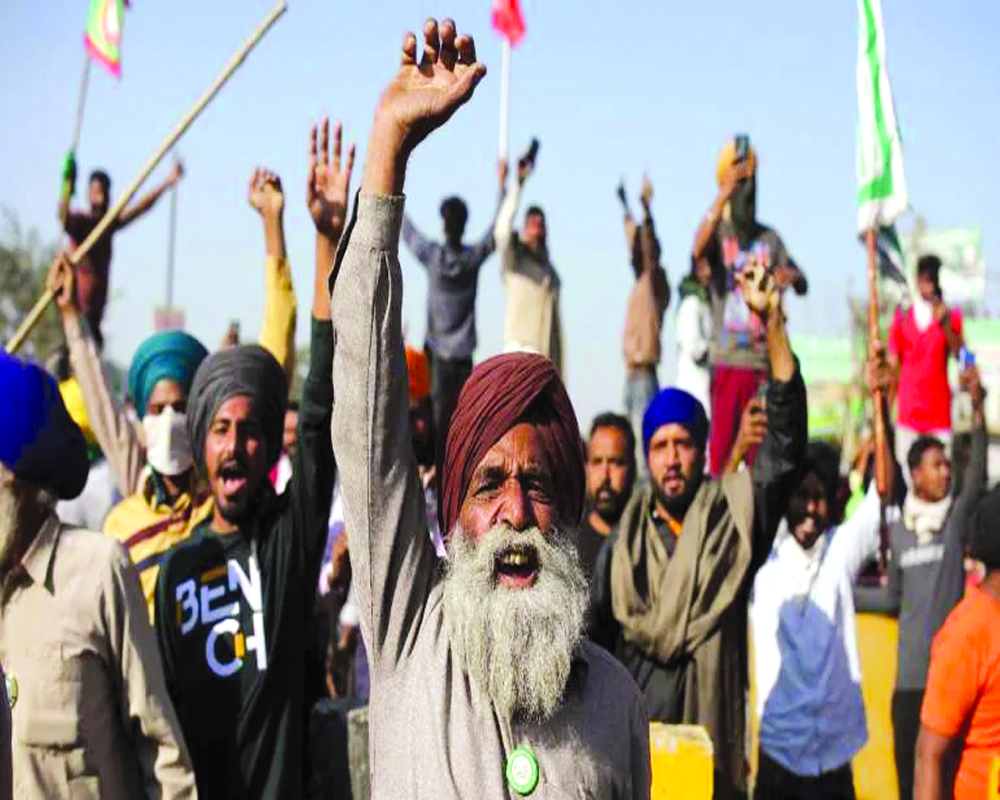The lack of traction with farmers, unlike with traders, has been a bane for the BJP. It has thereby failed to build a counterweight to the agitation
The Twitter handle of the BJP’s Kisan Morcha is a good indicator of the saffron party’s clout among farmers, or the lack of it. This might explain why the world’s largest and India’s ruling party is unable to sink its teeth into the agrarian community to build a counter-narrative to the farmers’ agitation. Some other parties like the CPI enjoy better traction, though electorally insignificant, with farmers. Rajkumar Chahar, the head of the Kisan Morcha, is also a Lok Sabha MP from Fatehpur Sikri constituency. Thus he has to act like any other MP, prioritising his political career over organisational work among farmers. In an interview with a Hindi daily, he had said in November that the growers were unwilling to meet any political leader. But this hardly seems to be the case as several political leaders have reached out to the protesting farmers. The BJP itself alleges that the farmers’ agitation is highly “politicised”. None has, to be honest, prevented the ruling party from “politicalising” a support that can act as a counterweight to the agitation.
The critics of the farmers’ protest have “securitised” the counter-narrative on social media. They perceive the cultivators’ movement solely through the prism of national security. The farmers’ movement is generally projected as a Khalistani campaign. Interestingly, Julio Reberio, IPS (Retd), the former DG of Punjab Police who adopted a bullet-for-bullet policy against Khalistani terrorists in 1980s and survived two assassination attempts, scoffs at such a suggestion. Anyone who recalls the dark days of Khalistani terrorism in the 1980s knows that it was aimed at severing Punjab from India. It manifested by the turn of 1980s as sanguineous attacks on Hindus to scare them away from the State. The Khalistanis were prepared for a similar reprisal against Sikhs across the rest of India. This way they would have achieved a forcible exchange of population, leading to the creation of a monolith Sikh state. By creating a sovereign Khalistan, they would have achieved a solitary prison for the Sikhs measuring 50,362 sq km and located between India and Pakistan. With no riverheads, no access to the sea and poorly developed industry, it would have been dependent on grain trade with India and Pakistan. India had the territorial depth to step up her food grain production gradually. An independent Punjab, however, would have been buried under mounds of grains had it lost a ready procurer in the form of New Delhi.
Genuine Khalistanis would have deployed their manpower to wrest Punjab through insurgency rather than sending unarmed men, women and children to sit on dharna on Delhi’s border. They would rather depend upon the support of 62 per cent population of Punjab who are Sikhs than appealing to the Union Government to repeal the three farm laws. How does the existence or repeal of farm laws help in achieving Khalistan? However, Khalistanis exist. They would be out of business if they don’t support the farmers’ agitation, which has become a mass movement in Punjab.
The merits (or demerits) of the farm laws apart, there is something mysterious about their origin. When exactly did the Government discover this golden route to farmers’ prosperity? Nothing remotely similar was promised in the BJP’s election manifestoes of 2014 and 2019. In 2019, one whole page was devoted to ‘Doubling Farmers’ Income’ (P13), out of which the Government has already fulfilled several promises. However, one would look in vain, hoping to find anything resembling the farm laws even in cryptic language there. The officials of the Ministry of Agriculture and Farmers’ Welfare did not seem to have any clue about these laws in February 2020 when they appeared before the Standing Committee on Agriculture in connection with the demand for grants (2020-21). They gave a different road map for doubling farmers’ income while being quizzed by the Standing Committee. Yet, by June 5, 2020, the farm laws had been promulgated through the ordinance route.
While the Government is referring to the recommendations of the Shankarlal Guru Committee (2000) and the MS Swaminathan Committee (2004-06) constituted by the previous Governments, it is mysteriously silent on the 14-volume report of the Committee for Doubling Farmers’ Income (2017-2018) chaired by Ashok Dalwai which this very Government had constituted. There was no such proposal in the DFI Committee recommendations to base the farm laws upon.
The rot in agriculture, despite the growth in production, goes deep. What was expected of the Government was a new agricultural policy, brought in after consultations with all stakeholders. This could have linked certain sustainable development goals in agriculture with the market. Demonising the APMC-run markets and the middlemen on the one hand, and on the other registering the same entities on the e-NAM (National Agricultural Market) portal and app in record numbers is paradoxical.
The ruling party should have invested efforts to build up a counterweight to the agitation. This could have been done by mobilising the silent majority of farmers peacefully outside the agitation belt. The party, however, seems to lack genuine base among farmers in sharp contrast with traders. For it, winning elections in five States is a priority.
(The writer is an author and independent researcher based in New Delhi. The views expressed are personal.)


























